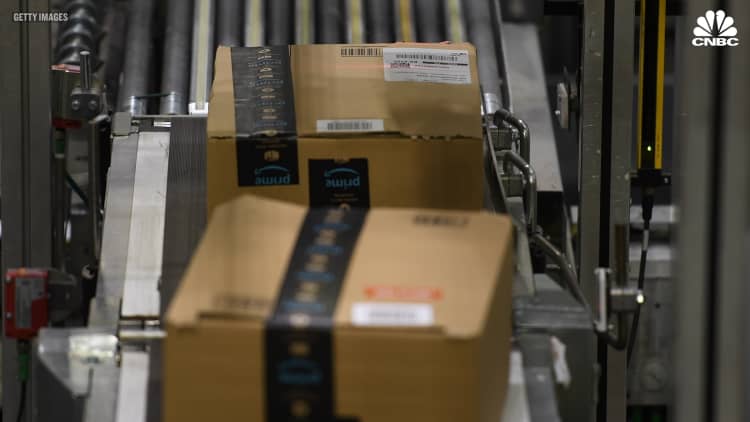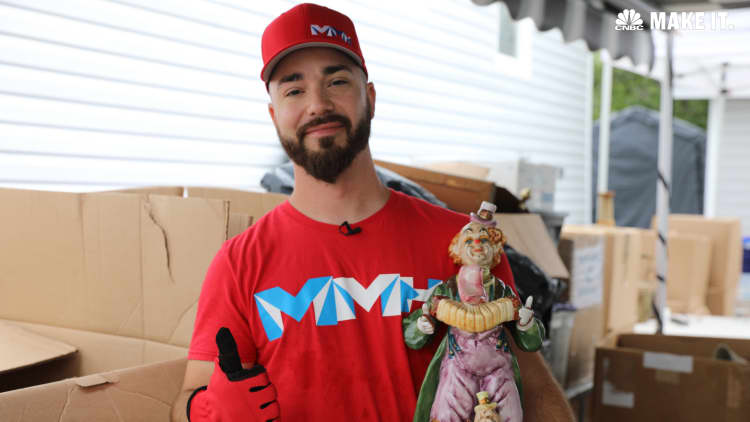Starting next month Amazon will raise its minimum wage to $15 an hour for U.S. employees. The company said the wage will benefit 250,000 full-time and 100,000 seasonal employees, and some workers who already make $15 will see increases too.
"We listened to our critics, thought hard about what we wanted to do, and decided we want to lead," said founder and CEO Jeff Bezos in a blog post on the company's website. "We're excited about this change and encourage our competitors and other large employers to join us."
Currently, starting pay for Amazon workers varies by location: At a warehouse in Austin, Texas, it's just $10 an hour. The median annual wage among all Amazon employees last year was just $28,446.
"That's, like, less than a teacher makes," comedian Sarah Silverman joked on a recent segment of her late-night talk show "I Love You, America," which aired prior to Amazon's announcement. It's also a sharp contrast from what their boss brings in. Bezos, the richest person in the world, makes more than his median employee in 10 seconds and has an estimated net worth of $163 billion, according to Forbes.

Criticism of the company's treatment of warehouse employees had grown increasingly loud in recent months. In early September, Sen. Bernie Sanders and Rep. Ro Khanna introduced a bill called the Stop Bad Employers by Zeroing Out Subsidies (BEZOS) Act, proposing a tax on corporations for every dollar their workers receive in government health care benefits or food stamps.
"Our legislation gives large, profitable employers a choice: Pay workers a living wage or pay for the public assistance programs their low-wage employees are forced to depend upon," Sanders wrote in a statement.
It's hard to determine exactly how many employees at large retailers like Amazon rely on welfare, since not all states keep track. But in April The Intercept reported that one out of three Amazon employees in Arizona depend on the Supplemental Nutrition Assistance Program, or food stamps, while in Ohio and Pennsylvania it's more like one in 10.
As Silverman noted, when workers rely on public assistance, that ends up costing American taxpayers. A report from the progressive coalition Americans for Tax Fairness found that Walmart employees' reliance on public assistance programs cost taxpayers $6.2 billion in 2013.
Since Walmart announced it was boosting its minimum wage to $11 earlier this year, the average full-time associate makes $14.07 per hour, according to Vox. That comes out to an annual salary of under $30,000.
Amazon has also been criticized for its alleged poor warehouse working conditions. In April, The Sun reported that some Amazon warehouse workers in the U.K. are under such drastic time constraints that they've resorted to peeing in bottles — "all so that you can get a $4 HDMI cable shipped overnight to stream new episodes of 'Bosch,'" Silverman joked.
Amazon disputes the report. "We have a focus on ensuring we provide a great environment for all our employees and last month Amazon was named by LinkedIn as the 7th most sought after place to work in the U.K. and ranked first place in the U.S.," a spokesperson said. In August, the company called repeated claims of poor working conditions "inaccurate and misleading."

Critics have applauded Amazon's decision to raise wages, and admit that it could very well lead to change in other industries.
"Today I want to give credit where credit is due, and that is that Mr. Bezos and Amazon have done the right thing," Sanders told the Washington Post, which Bezos owns, on Tuesday. "This is a significant step forward for many thousands of Amazon employees."
"Not only does this make a difference in the lives of hundreds of thousands of Amazon employees," he said, "it also sends a message to the fast food industry, the airline industry and the retail industry in general that the time is now to begin paying workers a living wage."
Don't miss: 70% of Americans now support Medicare-for-all—here's how single-payer could affect you
Like this story? Subscribe to CNBC Make It on YouTube!



